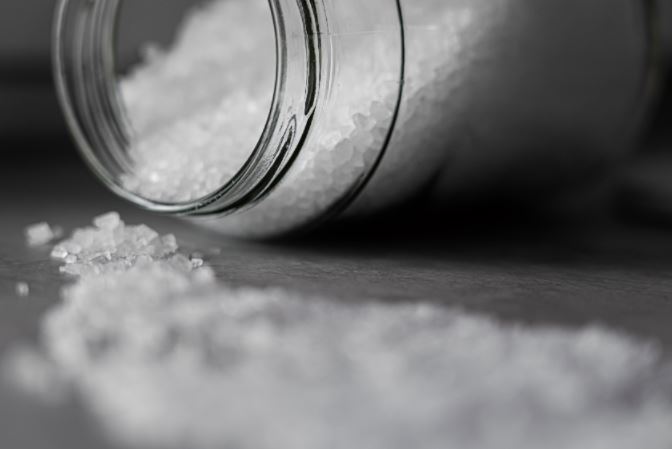Official medicine has been trying to persuade people not to eat “excessive amounts” of salt for almost 20 years, while others have contrary views. In fact, salt consumption seems to be a subject of passionate debate among medical and dietetics experts up to this day. As if there was no simple solution to the problem. But there is.
The issue last came up again because of the school canteens reform in 2016 in Hungary, where it gave rise to highly emotional arguments. The reform produced a rather interesting result: the saltshaker disappeared from the dining table and landed in the children’s pockets and bags. However, scientific solutions have not much to do with feelings and emotions as a rule. Now again, the key lies in the laws of nature.
Physicians and dietitians tend to think that “excessive” salt consumption leads to health problems like, for instance, high blood pressure, and this calls for the need to reduce the intake of salt. Widespread support for this view then helped shape the almost saltless Hungarian school meal.
But what is the truth? Is there a specified limit to salt intake? And does “excessive” salt consumption really cause elevated blood pressure?
Here are a few reliable arguments to answer the above questions:
- Let us take, for instance, the view that if we eat a larger amount of salt, it will raise our blood pressure. In fact, this is a physiological phenomenon. Our blood contains 0.9 mixed percent salt. When we eat salt, our body must maintain this chemical property. There is only one way to ensure that: we must drink water with the salt. Everyone knows that when we eat something salty, we get thirsty and drink. Just as well, because otherwise we would die!
- The above facts indicate that increased fluid content in our veins goes together with higher blood pressure, even if not in a direct ratio.
- It is another fact, however, that the kidneys eliminate the bigger fluid content and the sodium that gets into the body with the salt in a few hours. Remember how often we go to the toilet in this case.
- All this demonstrates, relatively simply and consistently, that this cannot be the cause of high blood pressure.
There are also some further facts:
- Lower intake of salt may push down the blood pressure by 4 to 8 mmHg on the average, which is a negligible difference, for instance, in case of a 180-mmHg pressure.
- It has become commonplace nowadays that fructose and, incidentally, other types of sugar may directly raise blood pressure. To be sure, an increasing number of experts recognize it as the actual cause of high blood pressure.
- It has never been proved that salt causes hypertension.
In addition, here is a very important fact, actually a simple biochemical and mathematical correlation:
- Sugars, in the first place glucose and fructose as well as carbohydrates in general that we eat daily, need the presence and support of sodium to be absorbed from the alimentary canal. The latter is a biochemical principle.
Consequently, if we consume a larger amount a carbohydrates, then we will need more salt, that is our salt requirement will increase. In those cases salt is essential, that is, we will add more salt to our food. If, however, we eat less carbohydrate, then originally saltless food will even taste salty for us.
Therefore, whereas experts are engaged in ardent debates today as to the ideal daily intake of salt, science provides an exact and unambiguous answer.
Our salt balance is self-regulated. The requirement for sodium ions determines the physiological requirement of salt. As sodium is quickly secreted in the urine and through perspiration, our daily salt requirement may rapidly change. It mostly depends on the amount of carbohydrates we eat. We cannot define the recommended daily amount because it depends on the individual person and his dietary habit. However, it adjusts to our carbohydrate consumption in every case.
So it is senseless to set limits on the quantity of salt intake. Food containing the same amount of salt may taste too salty on Monday and insipid on Tuesday. The observations of our research team and feedback from our patients have perfectly verified the principles described above. Moreover, we can take observations ourselves.
To be sure, you may use as much salt as you wish, as it will have no harmful effects. It will not cause hypertension. People whose diet contains added carbohydrates, chiefly glucose and fructose, would want to eat more salt. However, the same foods would taste too salty for a person on lowcarb or zerocarb diet.
Nonetheless, once you vote on salt, try to use original rock salt that contains no anticaking agents or any other additives. An anticaking agent is in fact a cyanide compound and no one has adequately ever examined its physiological effect. Nor is KCl (potassium chloride), a mineral supplement health gurus consider good, innocent because of its effect to cause arrhythmia. Remember to avoid it. The whiter a salt, the purer it is. The different rock salts contain different ions, metals that may occasionally exert physiological effects and cause complaints.
Salt is most often present, aside from the dinner table, in processed meat products. Therefore, it is worth examining before we buy the smoked ham we chose that what kind salt they used in the curing process. Avoid products processed by the application of salt containing nitrites and/or nitrates. Nitrite and, indirectly, nitrates, too, may cause cancer.
The article in German - der Artikel auf Deutsch
The article in Hungarian - a cikk magyarul

dr. Csaba Tóth
The author is a physician from Hungary with 20 years experience in intensive care medicine, internal medicine and family medicine. He is using the paleolithic ketogenic diet for 6 years in the treatment of chronic conditions including diabetes, autoimmune diseases and cancer.
English translation: Annamária Zsengellér
The Paleomedicina approach is that of evolutionary medicine which has a wholly scientific basis. We do not use naturopathic methods and we distance ourselves from such methods. Our scientific papers published in international medical journals can be viewed here.
2017-11-25
 Rehabilitáció csak online elérhető
Rehabilitáció csak online elérhető
 E-mail: paleomedicina@gmail.com
E-mail: paleomedicina@gmail.com



